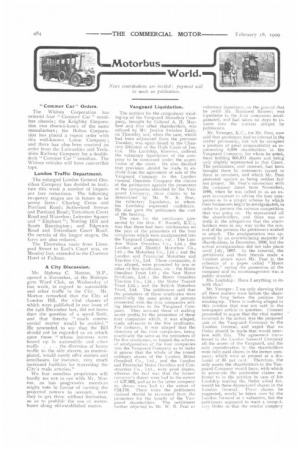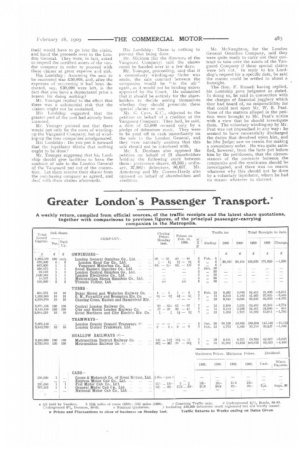Motorbus World.
Page 6

Page 7

If you've noticed an error in this article please click here to report it so we can fix it.
News contributions are invited : payment will be made on publication.
" Commer Car" Orders.
The Widnes Corporation has ordered four " Commer Car " omnibus chassis ; the Keighley Corporation two chars-a-hancs of the same manufacture; the Bolton Corporation has placed a repeat order with this well-known Luton Company ; and there has also been received an order from the Lancashire and Yorkshire Railway Company for a double
deck "Commer Car" omnibus. The Widnes vehicles will have convertible tops.
London Traffic Department.
The enlarged London General Omnibus Company has decided to institute this week a number of important fare reductions. The following twopenny stages are in future to be penny fares : Charing Cross and Portland Road; Sutherland Avenue and Portland Road; Tottenham Court Road and Waterloo; Leicester Square and " Elephant "; Notting Hill and South Kensington; and Edgware Road and Tottenham Court Road. On certain of the longer stages, the fares are also reduced.
The Electrobus route from Liverpool Street to Earl's Court was, on Monday last, extended to the Clarence Hotel at Fulham.
A City Discussion.
Mr. Alpheus C. Morton, M.P., opened a discussion, at the Bishopsgate Ward Club, on Wednesday of last week, in regard to automobile and other traffic in the City. Mr. Morton remarked that the City of London Bill, the vital clauses of which were published in our issue of the 24th December last, did not introduce the question of a speed limit, and that thereby " much controversial matter would be avoided," He proceeded to say that the Bill should not be regarded as an attack upon those " whose interests were bound up in automobile and ether traffic . . the diversion of heavy traffic to the side streets, as contemplated, would surely offer motors and omnibuses, for instance, very much increased facilities for traversing the City's main arteries." We fear omnibus proprietors will hardly see eve to eye with Mr. Morton, as less progressive members might Vote in favour of turning the projected powers to amount, were they to get them without limitation, so as to prohibit • the use of motorbuses along old-established routes:
Vanguard Liquidation.
The petition for the compulsory winding-up of the Vanguard MotorbUs Company, brought by Colonel A. II. Mayhew and four other shareholders, was refused by Mr. Justice Swinfen Eady, on Thursday last, when the case, which had been adjourned from the previous Tuesday-, was again heard in the Chaneery Division of the High Court of justice. His Lordship, however, ordered the voluntary liquidation of the company to be continued under the supervision of the court. Ile also decided that provision should be made to exchide from the agreement of sale of the Vanguard Company to the London General Omnibus Company the claims of the petitioners against the promoters of the companies absorbed by the Vanguard Company, these claims to be determined by Mr. W. B. Peat, the voluntary liquidator, in whom his Lordship expressed confidence. He also gave the petitioners the cost of the hearing.
The case for the petitioners (presented by the Hon. F. Russell, IC.C.), was that there had been misfeasance on the part of the promoters of the four companies which were amalgamated into the Vanguard Company, viz. : The London Motor Omnibus Co., Ltd. ; the London and District Motorbus Co., Ltd. ; the Motorbus Co., Ltd.; and the London and Provincial Motorbus and Traction Co., Ltd. These companies, it was alleged, were promoted by one or other of five syndicates, vie. 7 the Motor Omnibus Trust Ltd. ; the New Motor Syndicate, Ltd.; the Motor Omnibus Traction Co., Ltd. ; the Motor Transit Trust Ltd.; and the British Motorbus Trust, Ltd. The petitioners said that the promoters of these syndicates were practically the same group of persons connected with the four companies selling themselves to the Vanguard Company. They ac.c.u.secl these of making secret profits by the promotion of these four companies which, it was alleged, made advances to the five syndicates. For instance, it was alleged that the directors of the four companies, being practically the same as the promoters of the five syndicates, so framed the scheme
of amalgamation of the four companies • into the Vanguard Company as to make
it appear that the whole of the issued ordinary shares of the London Motor Omnibu4 Co., ltd., and the London and Provincial Motor Omnibus and Construction Co., Ltd., were good shares, whereas the fact was that the former company's shares were had to the extent of £37.993, and as to the latter company its shares were bad to the extent of J':24,716.. These sums the petitioners claimed should he recovered from the promoters for the benefit of the Vanguard shareholders, The petitioners further objected to Mr. W. B. Peat as voluntary liquidator, on the grotiud that he with Mr. Harmood Banner; was liquidator to the four companies amalgamated, and had taken no steps to inquire into the matters alleged by petitioners. Mr. Younger, KU., for Mr. Peat, now said that gentleman had no interest in the matter personally, but ielt he occupied a position of great responsibility as re. presenting 8,000 shareholders in the Vanguard Company, for whom he acted, these holding 665,911 shares and being only slightly represented in that Court. The petitioners, said counsel, had been brought there by statements issued to them in circulars, and which Mr. Peat protested against as being neither fair nor proper. Mr. Peat's connection with the company dated from November, 1006, when he was called in as an expert accountant to advise the four companies as to a proper scheme by which their businesses might be amalgamated, in order to prevent the ruinous competition that was going on. He represented all the shareholders, and there was no truth in the allegations that the shareholders were in any way under the control of the persons the petitioners wished to attack. The amalgamation was approved by an overwhelming majority of shareholders, in December, 1006, but the actual amalgamation did not take place until July, 1907. In the interval, the petitioners and their friends made a virulent attack upon Mr. Peat in the colunms of a paper called "Motor Finance," saying the promotion of the company and its mismanagement was a public scandal. His Lordship : Have I anything to do with this?
Mr. Younger : I am only showing that all these matters were before the shareholders long before the petition for winding-up. There is nothing alleged in this pstition that was not said in the newspaper article in question. Counsel proceeded to argue that the vital matter involved in the action was the proposed sale ol' the Vanguard Company to the London General, and urged that no Order should be made that would interfere with this. The agreement transferred to the London General Company all the assets of The Vanguard, and the only consideration te the shareholders were fully-paid shares in the former company, which were at present at a discount of 65 per cent. Therefore, the only assets the shareholders in the Vanguard Company would have, with which to prosecute the particular claims referred to in the petition in case of his Lordship making the Order asked for, would be these depreciated shares in the London General. Those claims he suggested, would be taken over by the London General at a valuation, but the petitioners appeared to want a compulsory Order so that the vendor company
itself would have to go into the claim, and hand the proceeds over to the London General. They were, in fact, asked to imperil the certified assets of the vendor company in order to proceed with these claims at great expense and risk. His Lordship : Assuming the sum to be recovered was £50,000, and, after the expenses of recovering it had been deducted, say, £30,000 were left, is the fact that you have a depreciated price a reason for doing nothing? Mr. Younger replied to the effect that there was a substantial risk that the claim; might not be sustained.
His Lordship suggested that the greater part of the cost had already been incurred.
Mr. Younger pointed out that there would not only he the costs of windingup the Vanguard Company, but of winding-up the four companies amalgamated.
His Lordship : Do you put it forward that the liquidator thinks that nothing ought to be done? Mr. Younger suggested that his Lordship should give facilities to have the contract of sa/e to the London General of the Vanguard put out of the contention. Let them receive their shares from the purchasing company as agreed, and deal with these claims afterwards. His Lordship : There is nothing to prevent that being done.
Mr. Micklem (for the directors of the Vanguard Company; said the shares could be handed over in a few days.
Mr. Younger, proceeding, said that if a compulsory winding-up Order was made, the sale contract between the companies would be "in the air" again, as it would not be binding unless approved by the Court. Ile submitted that it should be entirely for the shareholders to decide among themselves whether they should prosecute these special claims or not.
Mr. (i. Cave, K.C., objected to the petition on behalf of a creditor of the Vanguard Company. They had, he said, a debt of .C5,000 secured only by a pledge of debenture stock. They were to be paid off in cash immediately on the sale to the London General, and they were naturally anxious that this sale should not be interfered with.
Mr. A. Dunham also opposed the petition on behalf of 21 shareholders boldinz the following stock between them: preference shares, 43,595; ordinary, 37,982; debenture, 86,607. Mr. Armstrong and Mr. Cozens-Ilardy also opposed on behalf of shareholders and creditors.
Mr. NIcNaughton, for the London General Omnibus Company, said they were quite ready to carry out their contract to take over the assets of the Vanguard Company if these special claims were left out. in reply to his Lordship's request for a specific date, he Said the matter could be settled in about a fortnight.
The Hon. F. Russell having replied, his Lordship gave judgment as stated. In doing so, he said in connection with the charges of financial jugglery which they had heard of, no responsibility for that could rest upon Mr. W. B. Peat. None of the matters alleged in the petition were brought to Mr. Peat's notice with a view that he should investigate them_ The voluntary winding-up by Mr. Peat was not impeached in any way: he seemed to have successfully discharged the duties that devolved upon him, and he (the Judge) saw no reason for making a compulsory order. He was quite satisfied, however, from the facts put before him by the petitioners, that the circumstances of the contracts between the companies and the syndicates should be investigated, and there was no reason whatever why this should not be done by a voluntary liquidator, whom he had no reason whatever to distrust.
























